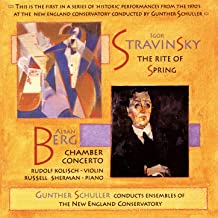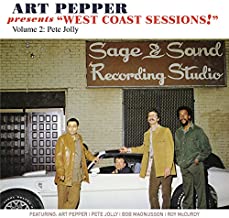-
Posts
13,205 -
Joined
-
Last visited
-
Donations
0.00 USD
Content Type
Profiles
Forums
Events
Blogs
Everything posted by Larry Kart
-
You should tell the Lester Bowie story about Jack.
-

What Classical Music Are You Listening To?
Larry Kart replied to StarThrower's topic in Classical Discussion
How could I forget this recording of the Berg? https://www.prestomusic.com/classical/products/8652809--berg-chamber-concerto-for-piano-violin-and-13-wind-instruments -

What Classical Music Are You Listening To?
Larry Kart replied to StarThrower's topic in Classical Discussion
The Schuller "Rite" is something else -- an electrifying and vividly recorded 1971 "live" performance by the New England Conservatory Student Orchestra. Sadly and against all expectations -- the pianist is Russell Sherman, a talented onetime student of Edward Steuermann, who played the work's premiere, the violinist is Rudolf Kolisch, who also played the premiere -- the coupled Berg Chamber Concerto under Schuller, another "live" performance from 1972, never comes to life. I'll try the Schuller-Berg again, hoping that maybe it's just me, but at this point I'm mystified. Could it be that the supposedly meticulous Schuller didn't know the work that well or just didn't "get" it. If so, he wouldn't be the first. IMO Boulez didn't. Heinz Holliger, for one, did, as did Robert Craft on an old Columbia 2-LP Berg set with pianist Pearl Kaufman and violinist. BTW Kaufman, a Hollywood studio mainstay as well as the first-call Los Angeles area modern music pianist, dubbed the piano music for Jack Nicholson's character in "Five Easy Pieces." -

What Classical Music Are You Listening To?
Larry Kart replied to StarThrower's topic in Classical Discussion
Both the Suitner and the Kubelik recordings are on YouTube. -

What Classical Music Are You Listening To?
Larry Kart replied to StarThrower's topic in Classical Discussion
Pfitzner's "Palestrina." I have two recordings now, Kubelik's much vaunted DG one with Gedda as the title figure and Fischer-Dieskau as the Cardinal who harries him, and an often top-notch supporting cast (Fassbender and Donath as Palestrina's apprentice and his son); and Othmar Suitner's more recent one (now on Brillliant Classics at a bargain price) with Peter Schreier, Siegfried Lorenz, et al. The Kubelik is better conducted, with a superior orchestra, but Suitner is no slouch, nor is his orchestra less than very good. The consensus on-line is go for the Kubelik, but I prefer Suitner. Gedda in this role, though generally extolled, doesn't do much for me, doesn't quite "inhabit" Palestrina, and it's a role that needs to be inhabited, while Schreier, is spot on dramatically and vocally, though I can imagine that Julius Patzak, a renowned Palestrina, was even better. Fischer-Dieskau really tips the balance against the Kubelik for me; his Cardinal Borromeo is very snarly, a truly nasty man, while Lenz's Borromeo, understandably out of patience with Palestrina's insistence that his composing days are over, is essentially sympathetic toward Palestrina, hoping to get him to compose again for the good of the Church, of Art, and for the good of Palestrina the man. A fascinating opera. Pfitzner wrote the libretto and no doubt identified with Palestrina. The libretto weaves historical figures from the Counter-reformation meetings of the Council of Trent of the mid 16th Century with the legend, already current in the late sixteenth century, that in writing the Missa Papae Marcelli Palestrina had single-handedly rescued polyphonic composition from banishment by the Catholic Church, in which key figures were advocating a return to the music of Gregorian chant because crucially important liturgical texts were less apprehendable, if they were apprehendable at all, in polyphonic settings. To be clear, the legend referred to above is false. Palestrina's Missa Papae Marcelli was written before the Council of Trent took place. -
Talked to Tatro on the phone some years ago (maybe 30 or so). Nice guy, pleased to know that I had fond memories of "Jazz for Moderns." He said that he'd send me a tape of a radio broadcast of the serial guitar concerto he wrote for Howard Roberts, but IIRC the tape began with an extended verbal intro from an announcer and then nothing. As I think we both know, that's little John Keonig (Lester's son) in the futuristic car. Some of the pieces on the album are haunting e.g. "Minor Incident," with its (probably) written out solos by Bob Enevoldsen and Bill Holman and that lovely horn call by Vince De Rosa.
-
-
Mock interviews I assume. Patton died in 1945 or '46 in a car crash in Germany.
-
Thanks, but a little out of the way for me.
-

Return Of The Film Corner Thread
Larry Kart replied to JSngry's topic in Miscellaneous - Non-Political
Yes, "Deathtrap." -
At what store? I need to pay a visit there.
-

Return Of The Film Corner Thread
Larry Kart replied to JSngry's topic in Miscellaneous - Non-Political
Utterly lame IMO. Doesn't anyone remember, in this puzzle mystery/joust vein, "Sleuth" or "The Last of Sheila" or the "Sleuth" semi-offshoot with Michael Caine and Christopher Reeve? -
Lovely Chet Baker vocal, fine work from pianist Phil Markowitz:
-
Ordered the Pepper-Stitt from Omnivore at a very reasonable price. Also found a copy of "Among Friends" at Half-Price Books today.
-
I'm a Freeman fan, but I can't stand Bill Watrous. How is the one with Konitz? Based on samples, I'd really like the one with Stitt, but that costs a minimum of $45.
-
A good one from 1977. Perhaps the presence of Pete Jolly was a contributing factor, but this harkens back to the feel of the Art 20 years or so before, no neo-Coltrane touches.
-

What Classical Music Are You Listening To?
Larry Kart replied to StarThrower's topic in Classical Discussion
-
Sounds right, but I don't recall any paperwork to that effect. For those keeping score at home, the "Consequence" liner notes jigsaw puzzle solved. On both the LP and CD versions, the first four graphs are in correct order, but the next graph, which begins "As evidence of this..." and the one that follows it ("The rhythm section is 'up' too...") should be preceded by the graphs that begin "Immediately striking here..." and "But Morgan turns..." (That is, graphs seven and eight of the LP and CD notes are graphs five and six in my original typescript.). The "rhythm section is 'up' too..." graph then should be followed by the one that begins "Somewhat overshadowed in critical esteem...". From there on, the notes are in the right order. And hooray re: the "Poppin' notes. I loved writing about Mobley, and I think that that was my best shot at it.
-
"A royalty is a legally-binding payment made to an individual, for the ongoing use of his or her originally-created assets." I don't recall that the "on-going use" question/issue ever came up. Yes, those assets (the liner notes) were originally created by me, but they weren't copyrighted by me so.... OTOH, as I said above, I didn't think or care about a second payment when I saw the US CD issue some years later. Rather, I was annoyed that the notes were still garbled when I easily could have untangled that mess for them. But they either didn't notice or didn't care.
-
Haven't thought about that aspect, but at least one other set of notes that I wrote in the early 1980s for Japanese Blue Note, Jackie McLean's "Consequence," was eventually used here with no payment to me. I never gave that a thought, though I was annoyed that the three-page typescript I had sent to Japan got jumbled up over there so that the final results --- there and later on over here -- are to some degree incoherent. I can explain how to sort things out so that the notes do make sense, if anyone cares.
-
BTW, does this edition of "Poppin'" have my liner notes, the ones I wrote for the album's original release on LP -- in Japan in 1982? Hope so; they were good. If not, and someone's curious, they're in my book. Or if not, and someone's REAL curious, I could try to post them here,
-

Question about buying from Incus website
Larry Kart replied to AaronG's topic in Miscellaneous Music
Hey -- a fellow Peter Riley admirer (if you mean Peter Riley the poet). -
-
Almost at the end of the set. The Herman Mars label band was a very good one -- all those tasty Ralph Burns arrangements, solos from Carl Fontana and Arno Marsh, and Art Mardigan was a cooking drummer. Don't miss Jerry Coker's rather abstract tenor solo on "I Love Paris" -- it's close to being in the Warne (not Arno) Marsh class, not that Arno wasn't a fine player.
_forumlogo.png.a607ef20a6e0c299ab2aa6443aa1f32e.png)




